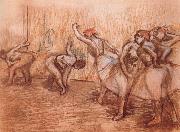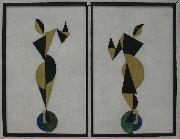Wholesale Oil Painting Reproductions No Minimum and Door to Door! |
|||||||||||
|
|
|||||||||||

|
|||||||||||
|
|
|
||||||||
All Edgar Degas Oil Paintings |
||||||||
|
|
||||||||
|
|
||||||||
|
Artist Introduction: French Realist/Impressionist Painter and Sculptor, 1834-1917
French painter, draughtsman, printmaker, sculptor, pastellist, photographer and collector. He was a founder-member of the Impressionist group and the leader within it of the Realist tendency. He organized several of the group exhibitions, but after 1886 he showed his works very rarely and largely withdrew from the Parisian art world. As he was sufficiently wealthy, he was not constricted by the need to sell his work, and even his late pieces retain a vigour and a power to shock that is lacking in the contemporary productions of his Impressionist colleagues. |
||||||||
|
|
||||||||
|
Dancers Painting ID:: 50023 |
mk206
about 1879
Gouache,oil pastel and essence on silk
30.5x59.7cm
|
|||||||
Height Width |
INS/CM Quality |
|||||||
|
X |
| |||||||
|
|
||||||||
All Edgar Degas Oil Paintings |
||||||||
|
|
||||||||
|
|
||||||||
|
Artist Introduction: French Realist/Impressionist Painter and Sculptor, 1834-1917
French painter, draughtsman, printmaker, sculptor, pastellist, photographer and collector. He was a founder-member of the Impressionist group and the leader within it of the Realist tendency. He organized several of the group exhibitions, but after 1886 he showed his works very rarely and largely withdrew from the Parisian art world. As he was sufficiently wealthy, he was not constricted by the need to sell his work, and even his late pieces retain a vigour and a power to shock that is lacking in the contemporary productions of his Impressionist colleagues. |
||||||||
|
|
||||||||
|
|
dancers Painting ID:: 66440 |
mk289 1902 pastel 83x112cm private collection |
||||||
Height Width |
INS/CM Quality |
|||||||
|
X |
| |||||||
|
|
||||||||
All Theo van Doesburg Oil Paintings |
||||||||
|
|
||||||||
|
|
||||||||
|
Artist Introduction: Dutch
1883-1931
Dutch painter, architect, designer and writer. He was officially registered as the son of Wilhelm Kepper and Henrietta Catharina Margadant, but he was so convinced that his mother second husband, Theodorus Doesburg, was his father that he took his name. Little is known of his early life, but he began painting naturalistic subjects c. 1899. In 1903 he began his military service, and around the same time he met his first wife, Agnita Feis, a Theosophist and poet. Between about 1908 and 1910, much influenced by the work of Honor Daumier, he produced caricatures, some of which were later published in his first book De maskers af! (1916). Also during this period he painted some Impressionist-inspired landscapes and portraits in the manner of George Hendrik Breitner. Between 1914 and 1915 the influence of Kandinsky became clear in such drawings as Streetmusic I and Streetmusic II (The Hague, Rijksdienst Beeld. Kst) and other abstract works. |
||||||||
|
|
||||||||
|
|
Dancers Painting ID:: 93141 |
Date 1916
TTD |
||||||
Height Width |
INS/CM Quality |
|||||||
|
X |
| |||||||
|
|
||||||||
|
Prev Next
|
||||||||
|
|
||||||||
|
Related Paintings to Theo van Doesburg :. |
||||||||
|
|
||||||||
|
CONTACT US |



